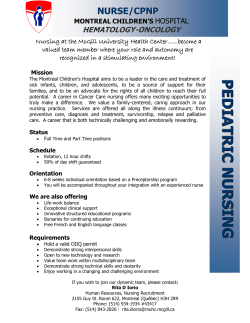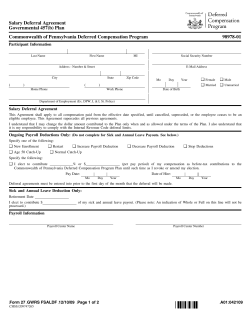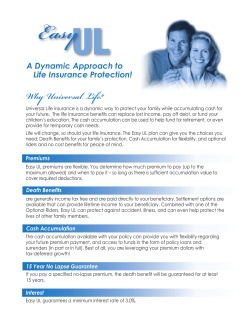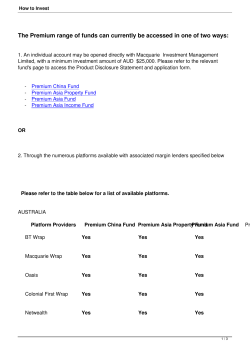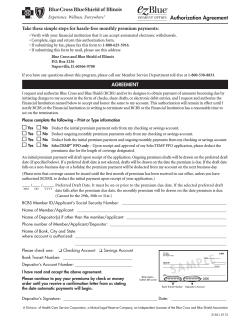
ASSOCIATION WORKERS’ COMPENSATION REFERENCE MANUAL
MONTANA ASSOCIATION OF COUNTIES WORKERS’ COMPENSATION REFERENCE MANUAL Revised JUNE 2014 TABLE OF CONTENTS DIRECTORY ....................................................................................................................................3 INTRODUCTION .............................................................................................................................4 CLASS CODES ...............................................................................................................................4 WAGES ...........................................................................................................................................4 PREMIUM CALCULATION ..............................................................................................................4 EXPERIENCE MODIFICATION .......................................................................................................4 MULTIPLE JOBS .............................................................................................................................5 SEPARATE JOBS ...........................................................................................................................5 VOLUNTEERS.................................................................................................................................5 SUBSEQUENT INJURY FUND .......................................................................................................5 EMPLOYEE OR INDEPENDENT CONTRACTOR ..........................................................................5 SHARED POSITIONS .....................................................................................................................7 A WORD ABOUT AUDITS ..............................................................................................................7 CLASS CODES BY JOB TITLE .......................................................................................................8 CLASS CODE 7704-FIREFIGHTERS AND DRIVERS .........................................................8 CLASS CODE 7720-POLICE AND DRIVERS ......................................................................8 CLASS CODE 8743-PROFESSIONAL & ADMINISTRATIVE EMPLOYEES .......................9 CLASS CODE 8810-CLERICAL / OFFICE EMPLOYEES ..................................................10 CLASS CODE 8824-NURSING HOMES ............................................................................11 CLASS CODE 9040-HOSPITAL / NURSING HOME EMPLOYEES ..................................11 CLASS CODE 9410-ADMINISTRATIVE/NON-PROFESSIONAL EMPLOYEES ................11 CLASS CODE 9016- AMUSEMENT PARK ....................................................................... 13 CLASS CODE 9420-ALL OTHER EMPLOYEES AND DRIVERS ..................................... 13 07/01/2012- 06/30/2012 WORKS’ COMPENSATION RATE.........................................................14 WORKERS’ COMPENSATION QUARTERLY PREMIUM REPORT ............................................15 1 TABLE OF CONTENTS APPENDIX A WORKERS’ COMPENSATION GUIDELINES I. SEARCH AND RESCUE VOLUNTEERS ................................................................................. A-2 II. SHERIFF RESERVE OFFICERS ........................................................................................... A-3 III. VOLUNTEER FIREFIGHTERS ............................................................................................... A-4 IV. VOLUNTEER AMBULANCE PERSONNEL ........................................................................... A-6 EMERGENCY MEDICAL SERVICES (First Responder Units) ......................................... A-7 V. COURT ORDERED COMMUNITY SERVICE WORKERS COUNTY JAIL TRUSTEES ..................................................................................................... A-7 VI. ELECTION JUDGES .............................................................................................................. A-8 VII. GENERAL VOLUNTEERS .................................................................................................... A-8 VIII. SUBSEQUENT INJURY FUND .......................................................................................... A-10 IX. USE OF SICK OR ANNUAL LEAVE WHILE ON WORKERS’ COMPENSATION ...................................................................................... A-11 X. DEPUTY SHERIFF PAYMENT OF PARTIAL SALARY WHILE INJURED ........................... A-12 XI. REPORTING OF INCIDENTS/ACCIDENTS AND FILING A CLAIM .................................... A-12 2 DIRECTORY Montana Association of Counties Workers’ Compensation Trust Harold Blattie, Trust Secretary Greg Jackson, Trust Administrator 2715 Skyway Drive Helena, MT 59602 (406) 449-4370 FAX (406) 442- 5238 E-mail: gjackson@mtcounties.org For underwriting, loss control/prevention, safety compliance and training assistance, contact: Montana Association of Counties Risk Management Program Emelia McEwen, Sr. Loss Control Specialist 2715 Skyway Drive Helena, MT 59602-1213 406-449-4370 FAX: 406-442-5238 E-mail: emcewen@mtcounties.org For claims filing, status information and reporting fraud, contact: MACo Claims Dennis Jupka, Claims Administrator Wendy Sesselman, Claims Supervisor PO Box 7059 2717 Skyway Drive Helena, MT 59604 (406) 442-1178 1-888-442-8552 E-mail: djupka@mtcounties.org wsesselman@mtcounties.org 3 INTRODUCTION: This manual is intended to lend assistance to clerk and recorders, payroll clerks and others who are responsible for assigning payroll classifications and reporting workers’ compensation premiums and wages. In most cases, class code placement is a simple procedure. The key is to have current job descriptions that are clear to the insurer. CLASS CODES: The payroll clerk places employees in a class code that properly falls within their job descriptions. That job description determines the risk factor, which plays a large role in the premium rate charged. For example, a police officer has a higher risk factor than an office clerk. Therefore, the premium rate charged for the police officer is significantly greater than the clerk. (Refer to pages 8 through 13 for a listing of class codes by job title.) The MACo Workers’ Compensation program uses nine class codes. These code numbers that are used industry-wide to identify employee occupations. For example, a clerk is Class Code 8810. A police officer is Class Code 7720. The insurer determines a premium rate for each class code, basing the rate primarily on claims experience. WAGES: “Wages” means the gross remuneration paid in money, or in a substitute for money, for services rendered by an employee. Wages include but are not limited to: (a) Commissions, bonuses and remuneration at the regular hourly rate for overtime work, holidays, vacation, and sickness periods and shift differential; (b) Board, lodging, rent or housing if it constitutes a part of the employee’s remuneration and is based on actual value. Wages do not include: (a) Employee expense reimbursements or allowances for meals, lodging, travel, subsistence and other expenses; (b) Contributions made to group insurance or pension plan; or vacation or sick leave benefits accrued but not paid. A broader definition of wages can be found in Montana Code Annotated 39-71-123. PREMIUM CALCULATION: The premium calculation formula is Payroll (Sum Total Base Rate) for this period x MACo rate Premium rates are calculated from the employee’s payroll, per $100 of earnings. For example, if class code 7720 - Law Enforcement payroll is $159,828 per quarter and the premium rate is 0.0421 ($4.21 per $100 of payroll), For example: Class Code 7720 Payroll (Sum Total Base Wage) x MACo Rate= Manual Premium $159,823.00 x .0421 = $6,728.00 EXPERIENCE MODIFICATION: Additional factors affect rates, such as the frequency and severity of work place accidents, medical costs, and indemnity (loss time) payments. This is expressed in the use of an experience modification factor. The factor can be either positive or negative. If the county has experienced a low accident frequency and severity, they may qualify for a discount, such as -5%. The Class Code 7720 premium manual rate of $6,728.00 show in the above example would be adjusted to $6,728.00. On the other hand, if the county had poor experience in accident frequency and severity, it would be charged additional premium. The Class Code 7720 manual premium of $6,728.00 would be adjusted to $7065.00 if the modification factor was +5%. 4 MULTIPLE JOBS: In some cases, an employee may have more than one job task that falls within the position. When that is the case, the class code for the greater job risk is to be used. For example, normally a person working in the sheriff’s office as a dispatcher is placed in Class Code 8810 (Clerical). However, if the dispatcher is assigned additional duties, such as serving meals to jail inmates, the risk factor is increased and now the dispatcher must be placed in Class Code 7720 (Police). SEPARATE JOBS: If an employee has two separate jobs in the county, the class code may be split. For example, an employee might work as a clerk for 30 hours per week and work as a cook at the jail 10 hours a week. The compensation would be split at 30 hours under Class Code 8810 (times the earnings in that job) and 10 hours under Class Code 9410 (times the earnings in that job). VOLUNTEERS: Premium rates are based on wages paid. Exceptions to this are for volunteers who qualify for coverage. These volunteers include search and rescue personnel, sheriff reserve officers, volunteer county firefighters, and volunteer county ambulance crews. ALL volunteers must be reported on a roster which is to be sent into MACo (smcgowan@mtcounties.org) on a monthly basis and the premium is then paid quarterly. The Appendix has instruction on how to calculate and report premiums for these positions. SUBSEQUENT INJURY FUND: A county may want to hire an individual who has had a previous job related injury or is vocationally handicapped. It is important to have that individual certified by the Subsequent Injury Fund, established in 1973. The intent is to assist vocationally handicapped individuals in obtaining employment by offering a financial incentive to employers for hiring certified individuals. Certification should be obtained prior to employment but no longer than (60) days after the date of hire. For instructions, refer to page A-10 of the Appendix. EMPLOYEE OR INDEPENDENT CONTRACTOR: A public entity faces great monetary liability and other civil and criminal sanctions if it improperly treats an individual as an independent contractor and it is determined that the individual is actually an employee. Employees are statutorily granted benefits and rights which independent contractors do not receive. Some of the primary benefits and rights include: minimum wage and overtime, unemployment insurance, social security, Medicare, reasonable accommodation, unpaid leave and medical insurance, workers’ compensation benefits, collective bargaining rights, and retirement system benefits. New legislation addressing the issue of independent contractor status was passed and was effective April 289, 2005. This legislation restores the conclusive presumption of independent contractor status which an independent contractor exemption issued by the Montana Department of Labor and Industry created prior to being overturned by the Montana Supreme Court. The law now requires that independent contractors must either have the independent contractor exemption issued by the Montana Department of Labor and Industry or must purchase workers’ compensation insurance for themselves. Failure of a county to verify that a worker has the exemption or has purchased workers’ compensation insurance will probably lead to the conclusion that the worker is an employee. To obtain an independent contractor exemption from the Montana Department of Labor and Industry, the worker must acknowledge that he has been and will continue to be free from control or direction over the performance of the person’s own services both under contract and in fact; and that the applicant is engaged in an independently established trade, occupation, profession, or business. To obtain an independent contractor exemption from the Department, the worker must obtain a total of 15 or more points from the following list. The Department may award points for items submitted up to the total points in each category. 5 6 The exemption only relates to the type of work listed on the exemption certificate and the independent contractor cannot have an agreement that the worker’s status is that of an employee. SHARED POSITION: When a county shares a position with another county, state or federal agency, a decision should be made as to who will act as the employer. The employer should be the one responsible for handling payroll deductions including workers’ compensation premiums. For example, County “A” and County “B” agree to share a sanitarian. County “A” agrees to pay 40% of the salary and County “B” pays 60%. County “B” also agrees to act as the employer. As the employer, County “B” handles the sanitarian payroll, including deductions for insurance, taxes and workers’ compensation, etc. County “A”, in turn, reimburses County “B” for 40% of County “B’s” expenses. Other shared county positions could include social workers, nurses, assessors, county attorneys, etc. A WORD ABOUT AUDITS: At the direction of the MACo Worker’s Compensation Trustees, compliance audits are performed. The purpose of the audit is to ensure that all members are reporting accurately. Prior to an audit, each county will receive a letter giving advance notice. At the conclusion of the audit, assuming that both parties agree on the adjustments, one party will reimburse the other for over- or underpayments, if there are any. Adjustments will go back to: 1. The beginning of the error, or 2. The last audit, or 3. The member county’s enrollment date. If a member county does not agree with the audit, the county may appeal to the Board of Trustees. The final decision will be that of the Trustees. Adjustments will not be required if the auditor determines that a reconciliation would not be economically advantageous to either party. 7 CLASS CODES BY JOB TITLES: The following is a list of occupations that normally fall within a given class code. As mentioned earlier, sometimes there are exceptions. If you have any questions or doubt as to an employee classification, contact MACo Risk Management, phone number 406-449-4370. CLASS CODE 7704- FIREFIGHTERS AND DRIVERS This includes any employee or volunteer firefighter who has duties associated with training, maintenance of equipment, traveling to and returning from, and fighting fires. The actual remuneration of all such individuals will be included with the payroll of regular firefighters in computing the premium. Instructions on establishing wages and computing premium can be found on pages 4 and 5. CLASS CODE 7720- POLICE AND DRIVERS Constables Coroners who are deputized (if not deputized refer to Class Code 8743) Detectives Dispatchers whose duties include working with inmates (If duties do not include working with inmates refer to Class Code 8810) Jailers Jail Nurses Probation Officers Process Servers ** Search and Rescue volunteers Sheriff Deputies ** Sheriff Reserve Volunteers Sheriffs Undersheriffs ** NOTE: Specific guidelines for reporting sheriff reserve and search / rescue volunteers are included in the appendix. 8 CLASS CODE 8743- PROFESSIONAL AND ADMINISTRATIVE EMPLOYEES Assessors (paid by the county) Auditors Cemetery Managers who do not operate equipment or engage in various kinds of manual activity (If the managers do operate equipment, refer to Class Code 9410.) Clerk and Recorders Clerks of District Court Community Service Coordinators Coroners and Deputy Coroners who are not deputized (Coroners who are deputized refer to Class Code 7720.) Computer Technicians County Dentists and Assistants County Extension Agents County Sanitarians County Surveyors (not street or highway) (If a street or highway, refer to Class Code 9410) County Attorneys County Treasurers County Commissioners who do not operate equipment or engage in various kinds of manual activity (If they do operate equipment, refer to Class Code 9410.) County Health Nurses, dieticians, nutritionists, (other than a hospital) County Managers County Planners County Superintendents Court Reporters Deputy County Attorneys Deputies to the Elected Officials DES Coordinators whose duties are confined to the office (If they are not confined to the office, refer to Class Code 9410.) Directors of nursing who are not involved in the day- to- day activity of transferring residents (If they are involved in transferring, refer to Class Code 8824 or 9040.) Doctors DUI Coordinators Election Administrators Environmental Inspectors 9 CLASS CODE 8743--CONTINUED Judges (district, election, justice of the peace and police judges) refer to page A-8 Law Clerks Librarians and assistants Medical Examiners Nursing Home / Hospital Administrators Parent Coordinators Paralegals Physical Therapists Professional supervisors whose duties are not confined to the office Program Managers Program Assistant Managers Project Coordinators Public Administrators Risk Managers Safety Officers / Directors Senior Citizen Managers Social Case Workers WIC Dieticians WIC Technicians CLASS CODE 8810 – CLERICAL / OFFICE EMPLOYEES Dispatchers whose duties are confined to the dispatch center (If the dispatcher has other duties, refer to Class Code 7720.) Engineers Office Draftsmen Office Clerks Secretaries 10 CLASS CODE 8824- NURSING HOMES Activities Directors involved in transferring of residents (If not involved in transferring, refer to Class Code 9410) All other employees involved in transferring of residents Certified Nurses Aides Directors of nursing involved in transferring residents (If not involved in transferring, refer to Class Code 8743) Licensed Practical Nurses involved in transferring residents (If not involved in transferring, refer to Class Code 9410) Nursing Home Activity Aides involved in transferring residents (If not involved in transferring, refer to Class Code 9410) Orderlies Registered Nurses involved in transferring of residents (If not involved in transferring, refer to Class Code 9410) CLASS CODE 9040- NON PROFESSIONAL BLENDED HOSPITAL / NURSING HOME EMPLOYEES Activity Directors Activity Aides All other employees involved in transferring of residents Certified Nurse Aides Directors of nursing who are involved in transferring residents (If not involved in transferring, refer to Class Code 8743) Licensed Practical Nurses Orderlies Registered Nurses involved in transferring residents. (If not involved in transferring, refer to Class Code 9410) CLASS CODE 9410- ADMINISTRATIVE OR NONPROFESSIONAL EMPLOYEES Airport Managers and employees (not pilots) Ambulance Drivers (Volunteer ambulance drivers are included in the Appendix.) Bailiffs Building inspectors Building engineers, maintenance engineers and janitors Cemetery Managers who do operate equipment or engage in various kinds of manual activity (If they do not operate equipment, refer to Class Code 8743.) 11 CLASS CODE 9410--CONTINUED Cooks County Commissioners who do operate equipment or engage in various kinds of manual activity (If they do not operate equipment, refer to Class Code 8743.) Curators Delivery persons for meals on wheels DES Coordinators and volunteers who are involved in field exercises and training (If they are not involved in field exercises, refer to Class Code 8743.) Emergency Medical Technician (EMT) and EMT First Responders Home Chore - Sr. Citizens Home Health care aides Janitors Kitchen helpers Laboratory employees Licensed practical nurses not involved in transferring residents (If involved in transferring, refer to Class Code 8824 or 9040, if in a hospital/nursing home) Meter readers Museum workers Nursing home and hospital food service employees Nursing home and hospital housekeepers Nursing Home Registered Nurses not involved in transferring residents (If involved in transferring, refer to Class Code 8824 or 9040, if in a hospital/nursing home) Nursing Home Restorative Aides Park Supervisors Refuse Supervisors/Solid Waste Managers who do not operate a collection or transfer site (If they do operate equipment, refer to Class Code 9420.) Road, bridge, shop, and weed control supervisors who do not operate equipment or engage in various manual activities (If they do operate equipment, refer to Class Code 9420.) Sewage disposals plant employees. Surveyors (street or highway) (For non-street or highway, refer to Class Code 8743) Swimming pool employees Theater/civic employees including box office, ticket takers, ushers, concession, camera & flood light operators. (Laborers, refer to Class Code 9420.) Water treatment plant employees X-ray technicians 12 CLASS CODE 9016-AMUSEMENT PARK A county uses this code to identify employees and volunteers who work during the time when an activity is going on, such as a county fair or concert. Many counties also have full time employees at fairgrounds that perform maintenance tasks, setting up and taking down equipment etc. These employees should be placed in the class code that best fits their job description. Examples include: maintenance 9410, Labor 9420, Clerical 8810 or 8743 etc. Code 9016 includes clerical and box office employees. Does not include operation or maintenance of amusement devices or rides All employees and volunteers involved in horse racing All employees and volunteers involved in fair activities CLASS CODE 9420- ALL OTHER EMPLOYEES AND DRIVERS Animal Control Officers Animal Trappers Bus Drivers Cemetery laborers Heavy equipment operators Laborers - road and bridge Landfill employees Landfill Managers/Supervisors who operate a collection or transfer site (If they do not operate transfer site, refer to Class Code 9410.) Livestock Inspectors (who are not Sheriffs) Parks grounds keepers/laborers Predator control officers Road and bridge, shop, and weed control supervisors who do operate equipment or engage in various kinds of manual activity (refer to class code 9410) Shop Mechanics Warehouse Workers Weed and mosquito sprayers All individuals on a jail trustee program who are performing work for the county Court ordered community service workers. 13 MACo WORKERS' COMPENSATION TRUST 2715 Skyway Drive, Helena, MT 59602 (406) 449-4370 DATE: May 7, 2014 TO: Commissioners, Clerks and Recorders, Nursing Home/Medical Ctr Directors and Accounting/Finance FROM: Greg Jackson, Shannon Shanholtzer, Emelia McEwen and Sara McGowan RE: MACo Workers' Compensation Class Code Rates and Modification Factors Effective for the upcoming policy year of July 1, 2014 – June 30, 2015 After careful consideration, the MACo Workers’ Compensation Trust Trustees adopted new rates as presented by the actuary that will take effect July 1, 2014, with the first payment to be included with the Payroll Report for the quarter ending September 30, 2014. The new Class Code rates for the reporting year of July 1, 2014 – June 30, 2015 are as follows: Class Code Description Current Rate/$100 (7/1/13-6/30/14) New Rate/$100 (7/1/14-6/30/15) 7704-vol. Firemen and Drivers – (volunteer) $130/yr Annual $130/yr Annual 7704-paid Firemen and Drivers – (paid) $12.03 $11.23 7720 Policemen and Drivers $4.21 $4.63 8743 Professional or Administrative Employees $0.80 $0.71 8810 Clerical Office Employees $1.23 $1.32 8824 Nursing Homes $21.37 $21.92 9016 Amusement Park Employees $6.11 $7.07 9040 Blended Nursing Home/Hospital Patient Care Handlers $18.43 $20.60 9410 Administrative or Non-professional Employees $5.96 $5.96 9420 All Other Employees and Drivers $7.29 $8.19 Effective July 1, 2014-June 30, 2015 the MOD FACTOR for 14 County is 1.04 MONTANA ASSOCIATION OF COUNTIES WORKERS' COMPENSATION TRUST EMPLOYER'S PAYROLL REPORT THIS REPORT IS DUE:07/15/14 DUE:07/15/08 WORKERS' COMPENSATION TRUST This Report is for the period: 04/01/14 to 06/30/14 Remit To: Montana Association of Counties W/C Trust AVG. # of Employees 2715 Skyway Drive this period:________ Helena, Montana 59602-1213 FILL OUT ONLY COLUNMS 3 & 4 # OF EMPLOYEE CLASSIFICATION DESCRIPTION (2) VOLUNTEER Firemen and *7704 Drivers-minimum yearly rate 1 PAID Firemen and Drivers*7704 based on calculated payroll value2 CLASS CODE (1) EMPL. PER CODE (3) 7720 Policemen and Drivers 8743 Professional or Administrative Employees 8810 Clerical Office Employees 8824 Nursing Homes - (under 50 beds) 9016 Amusement Park Employees Blended Nursing 9040 Home/Hospital Patient Care Administrative or Non9410 professional Employees All Other Employees and 9420 Drivers PAYROLL FOR THIS PERIOD (4) MACo RATE (5) N/A 130.00 MOD NET FACTOR RATE (6) (5) X (6)=(7) N/A N/A MOD FACTOR 1.04 MANUAL PREMIUM (4) X (5)= (8) EARNED PREMIUM (4) x (7)= (9) N/A 0.00 0.00 0.1203 1.04 0.1251 0.00 0.00 0.00 0.0421 1.04 0.0438 0.00 0.00 0.00 0.0080 1.04 0.0083 0.00 0.00 0.00 0.0123 1.04 0.0128 0.00 0.00 0.00 0.2137 1.04 0.2222 0.00 0.00 0.00 0.0611 1.04 0.0635 0.00 0.00 0.00 0.1843 1.04 0.1917 0.00 0.00 0.00 0.0596 1.04 0.0620 0.00 0.00 0.00 0.0729 1.04 0.0758 0.00 0.00 $0.00 0.00 TOTALS: 0 COUNTY: PREPARED BY: PHONE #: $0.00 If Volunteer firefighters are added during the year, the Trust is to be notified in a timely manner, which means if the added volunteer firefighter is injured and they are not listed on the roster, there will be no coverage. *7704 OPTIONS: 1. VOLUNTEER FIREFIGHTERS MACo requires minimum premium of $130 annual cost for each volunteer firefighter, to be paid annually (to be included in the July 1st-September 30th quarter). 2. PAID FIREFIGHTERS Based on calculated payroll value to be paid quarterly. Please refer to the MACo Workers' Compensation Manual Appendix for statute information.Page A-5 - A-7. Please e-mail back the completed report to MACo (smsr@mtcounties.org). Remit the premium with two copies of this report and one copy of your payroll report support to Sara McGowan at the above address shown (no later than the due date shown). Keep a 15 copy for your records. If you have any questions, please call Emelia McEwen at 406 449-4370.
© Copyright 2025
